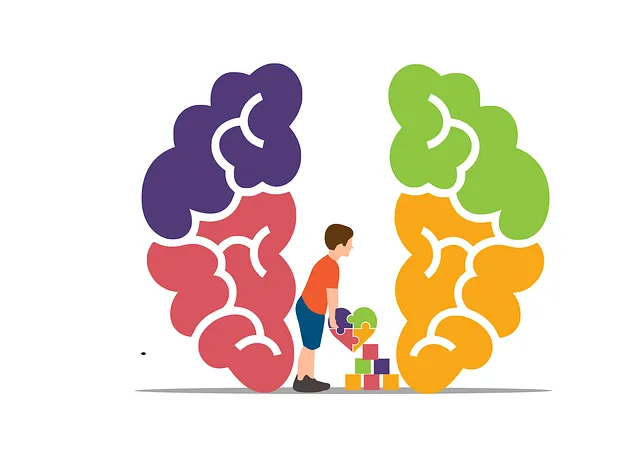Kaiser Permanente Mental Health Englewood offers comprehensive Social Skills Training (SST) using evidence-based methods, such as CBT and role-playing, to equip individuals with mental health conditions with crucial social skills, assertiveness, and emotional regulation techniques. Their holistic approach integrates Mind Over Matter principles, including stress management workshops and self-care practices, fostering confidence, communication, and supportive peer connections for improved social functioning and overall well-being. The Mental Wellness Podcast Series and awareness initiatives further support SST by sharing real-life stories and practical exercises, catering to diverse needs through tailored programs like mindfulness techniques and cultural competency training.
Social skills training is a powerful tool for individuals with mental health conditions, offering a unique approach to enhancing their overall well-being. This article explores the benefits of such programs, focusing on the role of Kaiser Permanente Mental Health Englewood in providing specialized social skills development. We’ll delve into the strategies employed, the impact on participants’ lives, and the challenges faced, offering valuable insights for those seeking effective support. Discover how these training sessions can foster connections and improve mental health outcomes.
- Understanding Social Skills Training for Mental Health Conditions
- The Role of Kaiser Permanente Mental Health Englewood in Social Skills Development
- Strategies and Techniques Used in Social Skills Training
- Benefits and Challenges of Social Skills Training Programs
Understanding Social Skills Training for Mental Health Conditions

Social Skills Training (SST) is a crucial component in addressing various mental health conditions, particularly those that isolate individuals from their communities and support networks. This evidence-based approach aims to empower people with the abilities to interact, communicate, and connect with others effectively. At Kaiser Permanente Mental Health Englewood, SST programs are designed to foster a sense of belonging and enhance overall mental wellness.
By participating in these training sessions, individuals learn essential social cues, assertiveness strategies, and emotional regulation techniques that facilitate meaningful interactions. The Mental Wellness Podcast Series produced by Kaiser Permanente offers valuable insights into the benefits of SST through real-life stories and expert guidance. Moreover, the Mental Health Awareness initiative includes journaling exercises that help participants reflect on their progress in building and maintaining healthy relationships, a key aspect of mental wellness.
The Role of Kaiser Permanente Mental Health Englewood in Social Skills Development

Kaiser Permanente Mental Health Englewood plays a pivotal role in fostering social skills development for individuals managing mental health conditions. Their comprehensive approach integrates Mind Over Matter Principles into various therapeutic interventions, empowering patients to navigate social interactions with increased confidence and resilience. Through tailored programs, this organization offers a safe space where participants can practice essential communication techniques, learn effective coping strategies, and build supportive peer connections.
Englewood’s dedicated team organizes engaging Stress Management Workshops and encourages the adoption of healthy Self-Care Practices, acknowledging their profound impact on mental well-being and social functioning. By holistically addressing these aspects, Kaiser Permanente Mental Health Englewood not only enhances individuals’ ability to engage in meaningful relationships but also promotes overall recovery and improved quality of life.
Strategies and Techniques Used in Social Skills Training

Social Skills Training employs a multitude of strategies and techniques to enhance individuals’ ability to interact effectively while managing their mental health conditions. These programs often include role-playing exercises, where participants practice social scenarios in a safe environment, allowing them to build confidence in their communication skills. Cognitive Behavioral Therapy (CBT) is another commonly used approach, teaching individuals to recognize and change negative thought patterns that may hinder social interactions. Additionally, group therapy sessions facilitate peer support and encouragement, fostering a sense of community and reducing feelings of isolation.
Kaiser Permanente mental health Englewood offers tailored programs designed to meet the unique needs of its diverse clientele. Their Mental Health Education Programs emphasize evidence-based practices such as mindfulness techniques for Anxiety Relief and cultural competency training for healthcare providers. These initiatives ensure that individuals with mental health conditions receive comprehensive support, promoting not just their social skills but also their overall well-being.
Benefits and Challenges of Social Skills Training Programs

Social Skills Training Programs offer a multitude of benefits for individuals managing mental health conditions, such as those supported by Kaiser Permanente mental health Englewood. These programs provide a structured environment to practice and develop essential communication skills, helping participants feel more comfortable in social situations. By learning effective strategies to initiate conversations, maintain eye contact, and interpret non-verbal cues, individuals can enhance their relationships and overall sense of belonging. Such training also equips them with tools to navigate challenging interactions, thereby reducing anxiety and promoting better mental well-being.
Despite their advantages, these programs face certain challenges. Engaging and maintaining interest in social skills groups can be difficult, especially for those dealing with depression or other conditions that affect motivation. Customizing the curriculum to cater to diverse learning needs within a group setting is another hurdle. Additionally, implementing successful Community Outreach Programs to make these training sessions accessible to all, including those from underserved communities, requires careful planning and coordination. Nevertheless, with continuous evaluation and adaptation, Social Skills Training can significantly contribute to the holistic improvement of mental health, incorporating practices like Self-Care Routine Development for Better Mental Health.
Social skills training, as a component of comprehensive mental health care, offers valuable support for individuals navigating various conditions. Organizations like Kaiser Permanente Mental Health Englewood play a pivotal role in developing and providing these programs, utilizing evidence-based strategies to enhance social interactions and overall well-being. By addressing the unique challenges faced by those with mental health issues, these training initiatives empower participants with essential skills, fostering better connections and improved quality of life. Despite potential challenges, the benefits of social skills training are evident, making it a crucial aspect of modern mental healthcare.






